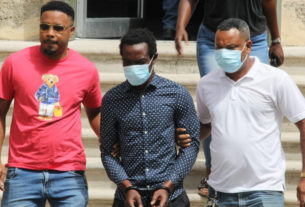October 28, 2015Press Release No. 15/483
October 28, 2015
Washington, DC – The Executive Board of the International Monetary Fund (IMF) approved disbursements to Dominica, Grenada, and St. Lucia following their requests under the Rapid Credit Facility (RCF) mechanism, with a combined SDR 48 million (US$65.6 million), to help cover their balance of payment needs stemming from the outbreak of the COVID-19 pandemic. Disbursements to all three countries are set at the maximum available access under the RCF instrument of 100 percent of quota for Grenada (SDR 16.4 million or US$ 22.4 million) and St. Lucia (SDR 21.4 million or US$ 29.2 million), and 89.4 percent of quota for Dominica (SDR 10.3 million or US$14 million). These countries are small states that are very vulnerable to shocks, including large natural disasters, with Dominica in particular still recovering from the devastation of Hurricane Maria in 2017.
The pandemic has hit these largely tourism-dependent countries very hard. Tourism inflows essentially came to a halt in mid-March, 2020, with ripple effects across other sectors. The closure of the borders, coupled with the curtailment of commercial activity, has had a debilitating impact on these economies. A drop in fiscal revenues, combined with additional direct health and social expenditures will temporarily increase the fiscal deficit and financing needs. IMF support will help cover some of these needs and allow the governments to ease the impact on the population, such as upgrading public health facilities and providing social assistance to the vulnerable and adversely affected sectors.
Following the Executive Board discussion of the requests, Mr. Tao Zhang, Deputy Managing Director and acting Chair, made the following statement:
“The COVID-19 pandemic poses a major challenge to Dominica, Grenada, and St. Lucia. Their key tourism sectors have been hit hard by the shock. The contraction in tourism is expected to have a major impact on their economies, by causing ripple effects across all economic sectors, eroding fiscal revenues, and creating urgent balance of payments pressures. In addition, these three small states are also highly vulnerable to natural disasters.
“The countries’ governments have responded to the pandemic by swiftly implementing containment measures, allocating scarce budgetary resources to critical health care spending, and introducing income support to the most affected sectors and households. Protection of the financial system will help cushion the economic impact of the pandemic. Measures have also been taken by the Eastern Caribbean Central Bank to facilitate the provision of credit and safeguard financial stability.
“The authorities have expressed commitment to meeting the regional debt target of 60 percent of GDP by 2030. To this end, they plan to implement necessary adjustment measures to rebuild policy space once the crisis has abated, building on the progress achieved in recent years. Looking forward, the authorities are also committed to implementing policies that support durable economic growth and poverty reduction within a balanced development strategy that includes comprehensive measures to boost resilience to natural disasters.
“IMF emergency support under the Rapid Credit Facility will help fill the three countries’ balance of payments needs and create fiscal space for essential health expenditures, income support to workers, and cash transfers to households. Fund financing will also help catalyze further donor support to close the remaining balance of payments needs.
“The IMF will continue to be engaged with Dominica, Grenada, and St. Lucia, and stands ready to provide policy advice and further support as needed.”
IMF Communications Department
MEDIA RELATIONS
PRESS OFFICER: RANDA ELNAGAR




